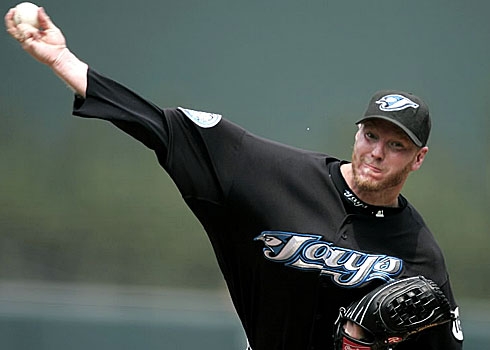Roy Halladay played 12 seasons in a Toronto Blue Jays uniform, earning six trips to the All-Star Game, winning the American League Cy Young Award in 2003 and establishing himself as one of the most dominant pitchers in Major League Baseball. Toronto never won more than 88 games or reached baseball’s postseason during Halladay’s tenure, yet the right-hander managed to top the 16-win mark on six occasions, even as his teammates struggled to stay afloat against superior competition. For over a decade, Blue Jay fans could head to the ballpark once every five days knowing that they might witness something spectacular: a no-hitter, double digits in strikeouts, or simply another run-of-the-mill Halladay complete game, of which he pitched 49 during his time in Toronto.
That all changed, of course, in December 2009, when freshly minted Jays GM Alex Anthopoulos pulled the trigger on a deal that sent Halladay to the Philadelphia Phillies in exchange for three prospects. Headlining a club one year removed from victory in the World Series, Halladay thrived, leading the National League in wins and innings pitched. On May 29th, 2010, he threw a perfect game against the Florida Marlins; four months later, he no-hit the Cincinnati Reds in his first career playoff game. Halladay has shown no signs of decline in his second year in Philadelphia, closing in on a second consecutive Cy Young and leading the Phillies to their fifth straight division championship.
Halladay’s success since the trade raises an intriguing question: Say he rounds out his career in Philadelphia, winning one or more World Series as a member of the Phillies. When all is said and done, will he be remembered by history as a player that racked up individual accolades for many years on the middling Toronto Blue Jays, or will the first twelve years of his career serve merely as a prelude to his days on the powerhouse Phillies?
The question has little to do with Halladay’s unmitigated dominance as a pitcher; rather, the implications lie more so with the identity of the Blue Jays franchise. Over the past decade, Jays fans had little more to root for throughout a season than for Halladay to make the All-Star team or win a major individual award. Even as Anthopoulos, Jose Bautista, Ricky Romero and Brett Lawrie usher in a new era of Toronto baseball, it’s still disheartening to look back on the last 10 years, see nothing more than a compendium of Halladay complete games and realize they might all be swept to the back of the history books if Doc continues to excel in Philly.
If that sentiment sounds completely selfish, it’s also not wholly accurate. If Toronto can’t compete with the Yankees or Red Sox from April to September, there’s nothing Blue Jay fans would want more than to see Halladay mow them down in October. Still, as Halladay once belonged to a small, rabid pocket of Canadian baseball fans, he now belongs to Philadelphia and the league at large, and the Blue Jays don’t have much to show for it.
The concept of a franchise player, in this case, isn’t only in the traditional sense of the phrase, signifying an otherworldly talent pegged to lead his franchise for a significant period of time. This particular use of “franchise player” implies a player forming a special connection with fans, truly belonging to a franchise, both in the present and the historical future.
It’s a notion that extends to other sports as well. Zdeno Chara first established himself as a top-pairing defenseman in Ottawa, before signing as a free agent in Boston, assuming the Bruins captaincy, winning a Norris Trophy and, five years later, hoisting the Stanley Cup. It’s both satisfying and sour for Sens fans to relive the highlights of Chara cackling maniacally as he lifted the Cup, knowing that we experienced his rise to prominence but weren’t around to reap any of the benefits.
You could, in a way, apply the concept to players of lesser regard; such as Chara’s teammate and longtime Senators fan favourite Chris Kelly. Beloved in our nation’s capital for his tireless defensive play and inexpugnable spirit, Kelly hit the jackpot with the trade that sent him to Boston in February. He was never considered one of the leading members of the Senators, and his exploits as a career third-line centre won’t be celebrated by history, but watching Kelly’s accomplishments in Ottawa fall by the wayside in the wake of his Cup victory is bittersweet nonetheless.
There’s still hope for Ottawa fans, despite the departures of Chara, Marian Hossa, Martin Havlat and many others, none of whom will be remembered as career Senators. Wade Redden, Chris Phillips and Daniel Alfredsson will always belong to the franchise in an historical sense; similarly, Mats Sundin will always be a Maple Leaf and Brett Favre will always be a Packer, their ignominious late-career exits notwithstanding. The situation is different for other franchises, however: Kevin Garnett is a Celtic, not a Timberwolf; Kareem Abdul-Jabbar is a Laker, not a Buck; Alex Rodriguez is a Yankee, not a Mariner or Ranger; and Roy Halladay is a Phillie, possibly for good.
Again, this isn’t meant to trash or disregard Halladay’s accomplishments; it’s the natural instinct of sports enthusiasts watching their team sputter to another .500 season. Despite this, every Blue Jays fan is rooting for their former ace to lead his new club to the championship. Consider Philadelphia’s games on July 1st and 2nd at the Rogers Centre, the first of which where Halladay presented the lineup card before the game, the second of which where Halladay pitched a complete game to beat the Blue Jays. Both times, the Toronto faithful rose as one, saluting the greatest player in their post-World Series era, appreciative of his triumphs both for and against them, applauding him as if he was one of their own. In a way, no matter what history decides, he always will be.

